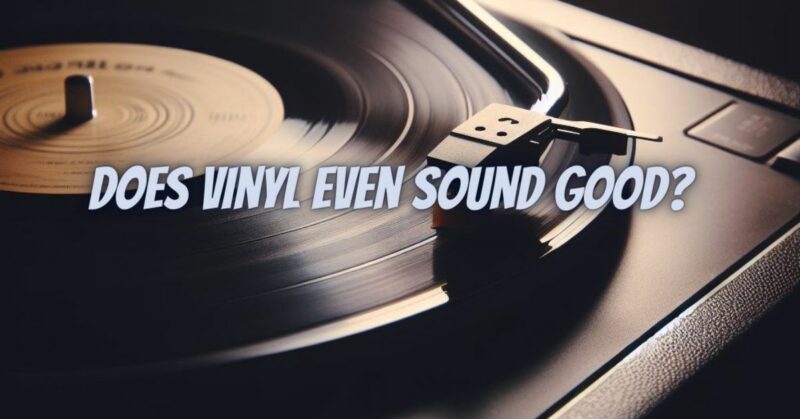In an era dominated by digital music streaming and high-resolution audio formats, vinyl records have made a remarkable resurgence. Vinyl enthusiasts and audiophiles passionately advocate for the analog format, extolling its unique sonic characteristics and tactile experience. This article delves into the question: Does vinyl even sound good? We will explore the audiophile appeal, the sonic qualities of vinyl, and the factors that contribute to its enduring popularity.
The Audiophile Appeal
Vinyl records have retained a devoted following of audiophiles who assert that the format offers an unparalleled listening experience. Here are some key reasons why vinyl holds such allure among audiophiles:
- Warmth and Analog Character: Vinyl records are celebrated for their warm, analog sound. This “analog warmth” is characterized by a rich, organic, and often slightly imperfect quality that many listeners find pleasing. It’s a stark contrast to the clinical precision of digital audio.
- Dynamic Range: Vinyl records often boast a wide dynamic range, allowing for greater subtlety and nuance in the music. This is especially appreciated when listening to classical, jazz, or acoustic genres where intricate details matter.
- Tangibility: Vinyl records are physical objects, and handling them adds a tactile dimension to the listening experience. The act of carefully placing a record on the turntable, dropping the needle, and flipping sides engages the listener in a way that digital playlists cannot replicate.
- Album Art and Packaging: Vinyl’s large format allows for intricate album art and packaging, making it a cherished collector’s item. The visual component enhances the overall enjoyment of the music.
Sonic Characteristics of Vinyl
To answer the question of whether vinyl sounds good, it’s essential to understand the unique sonic characteristics that distinguish vinyl records from digital formats:
- Vinyl Noise: Vinyl records are not immune to surface noise, including clicks, pops, and crackles. While some listeners find these imperfections charming, others may view them as distractions.
- Warmth and Coloration: Vinyl records can introduce a warm and slightly colored tonal character to the music. Some listeners adore this added dimension, while others prefer a more accurate representation of the recording.
- Analog Compression: Vinyl records are subject to analog compression, which can gently smooth out transients and create a sense of cohesiveness in the sound. This can be perceived as a desirable quality by some and a drawback by others.
- Limitations in Frequency Response: Vinyl records have limitations in both the low and high-frequency ranges. Deep bass frequencies may not be as pronounced, and extreme high frequencies may be rolled off, which can affect the overall sonic presentation.
Factors Affecting Vinyl Sound Quality
The sound quality of vinyl records can be influenced by various factors:
- Record Pressing Quality: The quality of the vinyl pressing process plays a crucial role in sound quality. High-quality pressings tend to offer superior fidelity and fewer surface noise issues.
- Turntable and Cartridge Quality: The turntable and cartridge used in playback significantly impact sound quality. High-end turntables with precision components can extract more detail from the grooves.
- Vinyl Condition: The condition of the vinyl record itself, including cleanliness and the presence of scratches or warps, can affect sound quality. Well-maintained records perform better.
- Analog Setup: Proper turntable setup, including correct tracking force, anti-skating, and cartridge alignment, is essential for optimal sound quality.
In answer to the question, “Does vinyl even sound good?” the response is both subjective and nuanced. Vinyl records offer a distinct listening experience appreciated by many audiophiles for their analog warmth, tactile engagement, and dynamic range. However, vinyl is not without its imperfections, including surface noise and limitations in frequency response.
Ultimately, whether vinyl sounds good depends on individual preferences and priorities in audio reproduction. For some, the allure of vinyl’s analog charm and tangible connection to music far outweigh its limitations. For others, the pursuit of pristine digital audio and convenience takes precedence. Regardless of personal preference, vinyl records continue to hold a special place in the world of music, offering a nostalgic, immersive, and unique way to engage with the art of sound.


